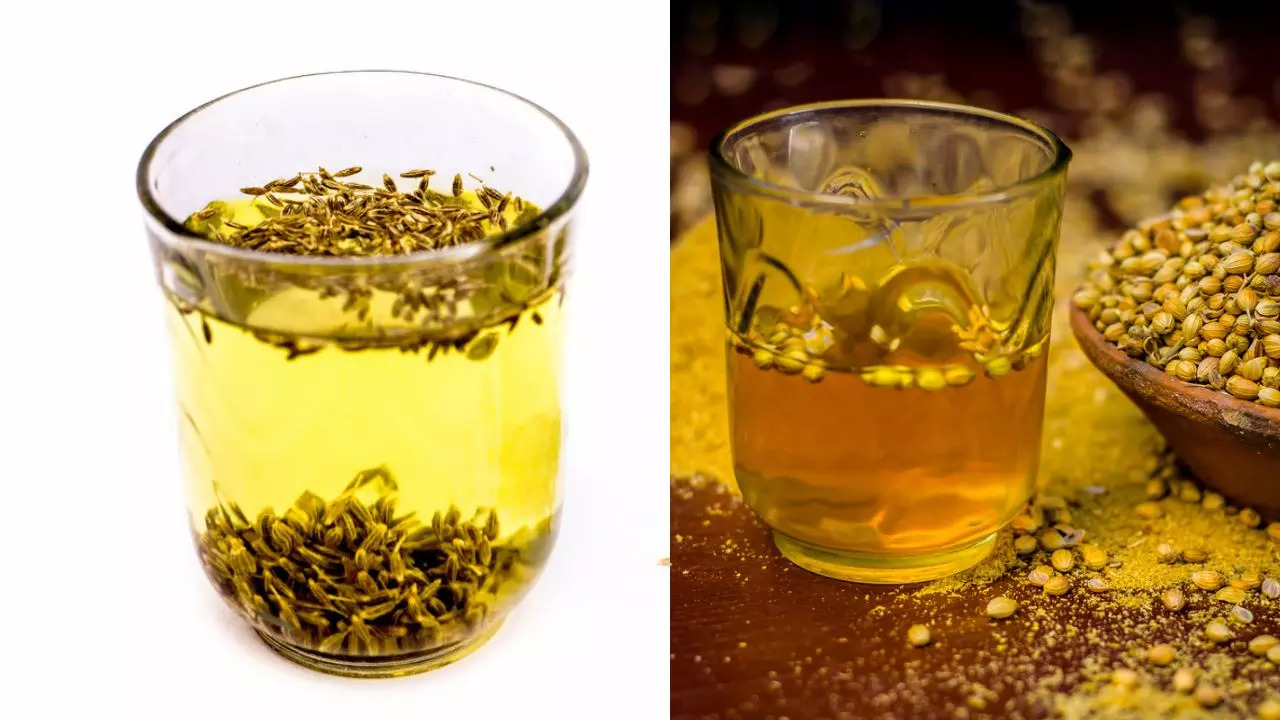Jeera water or coriander seed water: Which is better for you? (Image: iStock)
In the quest for health and wellness, many people turn to natural remedies that are both accessible and effective. Cumin (jeera) and coriander seeds are two such ingredients, which are traditionally incorporated into Indian cooking, not only for their aromatic qualities but also for their potential health benefits. Consuming water infused with cumin or coriander seeds has become a popular practice, particularly as a morning ritual intended to promote overall well-being. However, the comparative benefits and risks associated with these practices deserve closer examination.
Times Now Digital spoke to Riya Desai, Senior Dietitian, Wockhardt Hospitals, Mira Road, to understand the potential benefits of both.
Health benefits
She said, “Both cumin and coriander seeds are packed with bioactive compounds that contribute to their wide range of health benefits, from aiding digestion to providing antioxidant support.” While the main bioactive compounds in cumin seeds include cuminaldehyde, which possesses antimicrobial and anti-inflammatory properties; thymol, known for its digestive and antiseptic effects; and flavonoids, which are potent antioxidants that help fight oxidative stress, the key components in coriander seeds include linalool, a compound known for its anti-inflammatory and antioxidant properties; coriandrin, which has been studied for its potential lipid-lowering effects; flavonoids such as quercetin, which provide antioxidant benefits; coumarins, which may support blood circulation; and dietary fiber, which aids digestion and gut health.
Possible side effects
Dr Riya explained, “Despite their benefits, both jeera and coriander seed water can have side effects, especially if consumed in excess. Jeera, for example, can increase gastric acid secretion, leading to heartburn or acid reflux in sensitive individuals. On the other hand, excessive consumption of coriander seeds can interfere with liver function due to their high content of certain bioactive compounds.”
Things to keep in mind
People with specific health conditions should be cautious. For example, people with diabetes should be aware that both jeera and coriander seeds have been shown to lower blood sugar levels, which could exacerbate hypoglycemia if not properly managed. Additionally, there is some evidence to suggest that these seeds might influence hormonal balance, which could affect menstrual cycles in women. Given these potential risks, it is crucial to consult a doctor before incorporating these practices into your routine, especially if you have pre-existing health conditions or are taking medications.
What does Ayurveda say? From an Ayurvedic point of view, both jeera and coriander seeds are considered beneficial in balancing the digestive fire (Agni) and detoxifying the body. However, Ayurveda also emphasizes the importance of individual constitution (Prakriti) in determining the suitability of such remedies. Therefore, while these practices may be beneficial for some people, they may not be appropriate for others depending on their dosha (body type).
According to scientific research, the optimal way to consume jeera (cumin) and coriander seeds to get the maximum benefit involves several key methods:
- Soaking and boiling:Soaking jeera or coriander seeds overnight and then boiling them in water can help release their beneficial compounds. This method makes the nutrients more bioavailable and easier to digest. Consuming water can aid digestion and detoxification.
- Toasted:Lightly roasting jeera seeds before grinding them can improve their flavor and release essential oils, which increases their antioxidant properties. Coriander seeds can also be roasted to improve their flavor and effectiveness.
- Soil shapeGrinding jeera and coriander seeds just before use preserves their volatile oils and active compounds. This form can be added to foods or beverages, offering a convenient way to incorporate their benefits into your diet.
- Moderation:It is recommended to consume these seeds in moderation to avoid possible side effects. In the case of jeera, it is considered safe to consume up to 1-2 teaspoons a day, while in the case of coriander, a similar amount is recommended.
- Combination:Using jeera and coriander seeds together in cooking can synergistically enhance their digestive and antioxidant benefits. However, it is essential to balance their consumption to avoid adverse effects.
Conclusion
In short, while jeera and coriander seed water may offer various health benefits, it is not without potential risks. The decision to use one or the other should be based on individual health needs, potential side effects, and professional medical advice. Blindly following health trends without considering personal health factors can lead to adverse outcomes. Therefore, it is essential to seek guidance from health professionals to ensure safe and effective use of these natural remedies.
Disclaimer:
The information contained in this post is for general information purposes only. We make no representations or warranties of any kind, express or implied, about the completeness, accuracy, reliability, suitability or availability with respect to the website or the information, products, services, or related graphics contained on the post for any purpose.
We respect the intellectual property rights of content creators. If you are the owner of any material featured on our website and have concerns about its use, please contact us. We are committed to addressing any copyright issues promptly and will remove any material within 2 days of receiving a request from the rightful owner.

